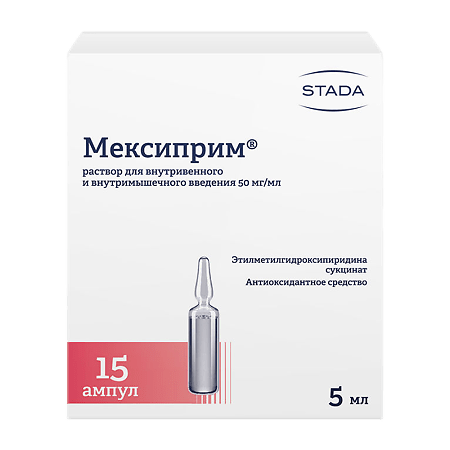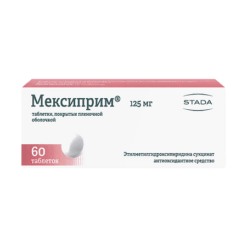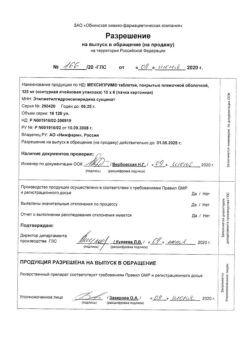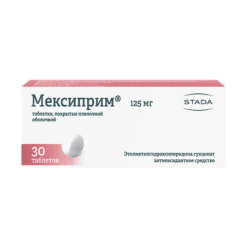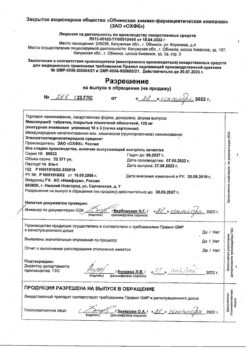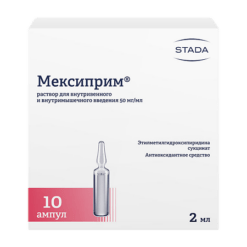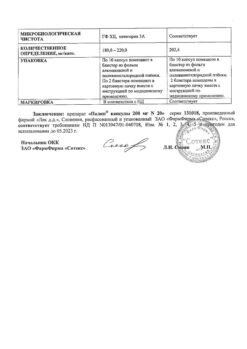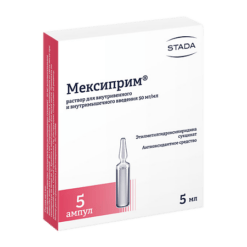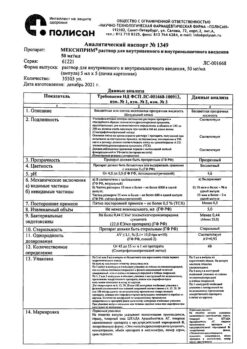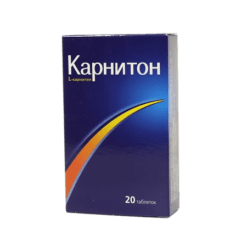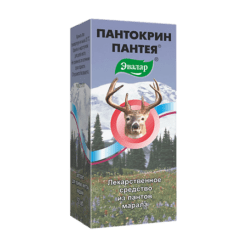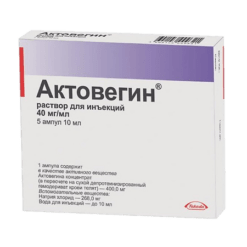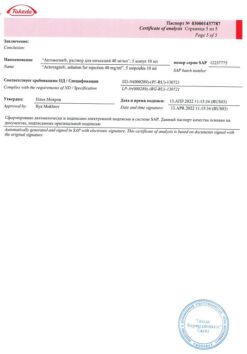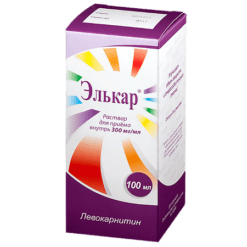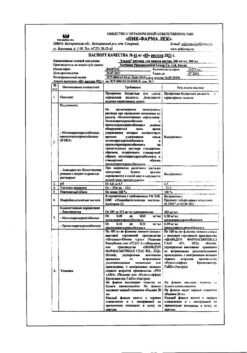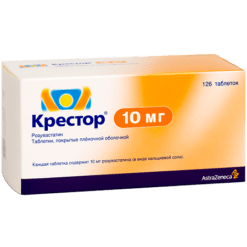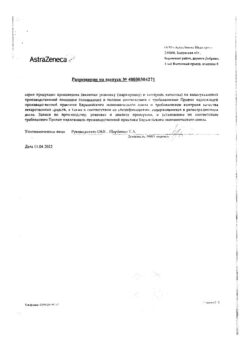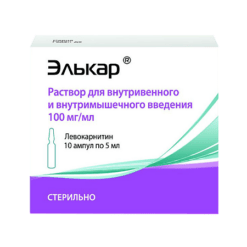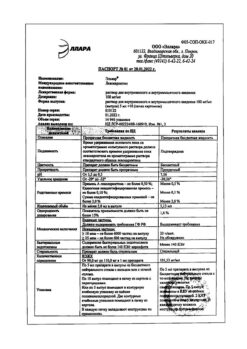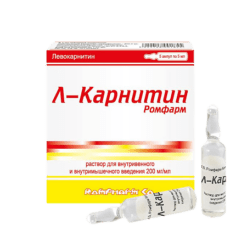No products in the cart.
Mexiprim, 50 mg/ml 5 ml 15 pcs
€1.00
Out of stock
(E-mail when Stock is available)
Description
Mexiprim belongs to the heteroaromatic antioxidants.
It has a wide range of pharmacological activity: increases the body’s resistance to stress, shows anxiolytic effect, not accompanied by drowsiness and myorelaxant effect; has nootropic properties, prevents and reduces learning and memory disorders arising from aging and exposure to various pathogenic factors; has anticonvulsant effect; shows antioxidant and antihypoxic properties; increases attention concentration and performance; weakens the toxic effects of alcohol.
The drug improves brain tissue metabolism and blood supply, improves microcirculation and blood rheology, reduces platelet aggregation.
Stabilizes membrane structures of blood cells (erythrocytes and platelets). It has hypolipidemic effect, decreases the total cholesterol and low-density lipoproteins.
Mechanism of action of Mexiprim is due to its antioxidant and membrane-protective effect.
It inhibits lipid peroxidation, increases superoxidase activity, increases lipid-protein ratio, decreases membrane viscosity and increases its fluidity.
Modulates the activity of membrane-bound enzymes (calcium-independent phosphodiesterase, adenylate cyclase, acetylcholinesterase), receptor complexes (benzodiazepine, GABA, acetylcholine) that increases their ability to bind to ligands, maintains structural and functional organization of biomembranes, neurotransport and improves synaptic transmission.
Mexiprim increases dopamine content in the brain.
Causes compensatory activation of aerobic glycolysis and a decrease in the degree of inhibition of oxidative processes in the Krebs cycle in hypoxia with an increase in ATP and creatine phosphate, activation of energy-synthesizing functions of mitochondria, stabilization of cell membranes.
Pharmacokinetics
Maximum concentration of Mexiprim in plasma is within the range of 50 to 100 ng/ml.
Half-life of Mexiprim and average time of drug retention in the body are 4.7-5.0 hours and 4.9-5.2 hours respectively.
Mexiprim in humans is extensively metabolized to form its glucuron-conjugated product.
On average over 12 hours 0.3% of unchanged drug and 50% as glucuronoconjugate of the administered dose are excreted with urine.
Mexiprim and its glucuronoconjugate are excreted most intensively during the first 4 hours after drug administration.
Indicators of urinary excretion of Mexiprim and its conjugated metabolite have significant individual variability.
Indications
Indications
Acute cerebrovascular accidents (as part of complex therapy);
Discirculatory encephalopathy;
Vegetative-vascular dystonia;
Anxiety in neurotic and neurosis-like conditions;
Mild cognitive disorders of various origins (psycho-organic and asthenic syndromes, consequences of traumatic brain injuries, atherosclerosis, senile and atrophic processes, neuroinfections and intoxications);
Memory disorders and intellectual disability in the elderly;
Exposure to extreme (stress) factors;
Withdrawal syndrome in alcoholism with a predominance of neurosis-like and vegetative-vascular disorders;
Acute intoxication with antipsychotic drugs.
Pharmacological effect
Pharmacological effect
Mexiprim is a heteroaromatic antioxidant.
It has a wide range of pharmacological activity: it increases the body’s resistance to stress, exhibits an anxiolytic effect that is not accompanied by drowsiness and a muscle relaxant effect; has nootropic properties, prevents and reduces learning and memory disorders that occur with aging and exposure to various pathogenic factors; has an anticonvulsant effect; exhibits antioxidant and antihypoxic properties; increases concentration and performance; weakens the toxic effect of alcohol.
The drug improves the metabolism of brain tissue and their blood supply, improves microcirculation and rheological properties of blood, and reduces platelet aggregation.
Stabilizes the membrane structures of blood cells (erythrocytes and platelets). Has a lipid-lowering effect, reduces the content of total cholesterol and low-density lipoproteins.
The mechanism of action of Mexiprim is due to its antioxidant and membrane protective effect.
It inhibits lipid peroxidation, increases superoxide oxidase activity, increases the lipid-protein ratio, reduces membrane viscosity, and increases its fluidity.
Modulates the activity of membrane-bound enzymes (calcium-independent phosphodiesterase, adenylate cyclase, acetylcholinesterase), receptor complexes (benzodiazepine, GABA, acetylcholine), which enhances their ability to bind to ligands, helps preserve the structural and functional organization of biomembranes, transport of neurotransmitters and improve synaptic transmission.
Mexiprim increases dopamine levels in the brain.
Causes an increase in compensatory activation of aerobic glycolysis and a decrease in the degree of inhibition of oxidative processes in the Krebs cycle under hypoxic conditions with an increase in the content of ATP and creatine phosphate, activation of the energy-synthesizing functions of mitochondria, stabilization of cell membranes.
Pharmacokinetics
The maximum concentration of Mexiprim in blood plasma ranges from 50 to 100 ng/ml.
The half-life of Mexiprim and the average retention time of the drug in the body are 4.7-5.0 hours and 4.9-5.2 hours, respectively.
Mexiprim is intensively metabolized in the human body with the formation of its glucuron-conjugated product.
On average, over 12 hours, 0.3% of the unchanged drug and 50% of the administered dose are excreted in the urine in the form of glucuronoconjugate.
Mexiprim and its glucuronoconjugate are excreted most intensively during the first 4 hours after taking the drug.
The urinary excretion rates of Mexiprim and its conjugated metabolite have significant individual variability.
Special instructions
Special instructions
The degree of restrictions is determined by individual tolerability of the drug.
During the treatment period, care must be taken when driving vehicles and engaging in other potentially hazardous activities that require increased concentration and speed of psychomotor reactions.
Active ingredient
Active ingredient
Ethylmethylhydroxypyridine succinate
Composition
Composition
Composition per 1 ml:
Ethylmethylhydroxypyridine succinate – 50 mg
Water for injections – up to 1 ml.
Contraindications
Contraindications
Acute liver and/or renal failure, increased individual sensitivity to the drug.
Children’s age, pregnancy, breastfeeding – due to insufficient knowledge of the effect of the drug in these categories of patients.
Side Effects
Side Effects
Rarely – nausea, dry mouth, drowsiness, allergic reactions.
Interaction
Interaction
Compatible with psychotropic drugs.
Enhances the effect of benzodiazepine anxiolytics, anticonvulsants (carbamazepine), antiparkinsonian drugs (levodopa), reduces the toxic effect of ethyl alcohol.
Overdose
Overdose
Symptoms: sleep disturbance (insomnia, in some cases drowsiness).
Treatment: as a rule, not required – symptoms disappear on their own within 24 hours.
In severe cases of insomnia, it is recommended to take sleeping pills.
Prescribing
Prescribing
Antioxidant
Storage conditions
Storage conditions
In a place protected from light at a temperature not exceeding 20°C. Keep out of the reach of children.
Shelf life
Shelf life
3 years. Do not use after the expiration date indicated on the package.
Manufacturer
Manufacturer
Nizhpharm JSC, Russia
Additional information
| Shelf life | 3 years. Do not use after the expiry date printed on the package. |
|---|---|
| Conditions of storage | Store in a place protected from light at a temperature not exceeding 20°C. Keep out of reach of children. |
| Manufacturer | Nizhpharm AO, Russia |
| Medication form | solution |
| Brand | Nizhpharm AO |
Other forms…
Related products
Buy Mexiprim, 50 mg/ml 5 ml 15 pcs with delivery to USA, UK, Europe and over 120 other countries.

